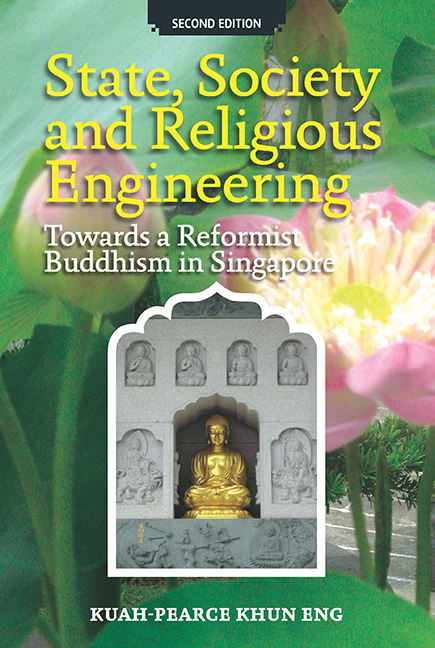Book contents
- Frontmatter
- Contents
- List of Diagrams
- Note on Romanisation
- Preface to the Second Edition
- Acknowledgements to the Second Edition
- Introduction
- PART 1 INVENTING A RELIGIOUS TRADITION
- PART 2 STATE, SOCIETY AND RELIGIOUS ENGINEERING
- 3 Bureaucratising the Temple and the Sangha
- 4 Establishing an Ethno-Religious Framework and the Religious Law
- 5 Buddhist Welfare and Charity
- 6 Experimenting with Religious Values as Asian Values
- PART 3 TOWARDS A REFORMIST BUDDHISM
- Conclusion
- Postscript to the Second Edition: Towards a Humanist and Socially-engaged Buddhism
- Glossary
- Bibliography
- Index
6 - Experimenting with Religious Values as Asian Values
from PART 2 - STATE, SOCIETY AND RELIGIOUS ENGINEERING
Published online by Cambridge University Press: 21 October 2015
- Frontmatter
- Contents
- List of Diagrams
- Note on Romanisation
- Preface to the Second Edition
- Acknowledgements to the Second Edition
- Introduction
- PART 1 INVENTING A RELIGIOUS TRADITION
- PART 2 STATE, SOCIETY AND RELIGIOUS ENGINEERING
- 3 Bureaucratising the Temple and the Sangha
- 4 Establishing an Ethno-Religious Framework and the Religious Law
- 5 Buddhist Welfare and Charity
- 6 Experimenting with Religious Values as Asian Values
- PART 3 TOWARDS A REFORMIST BUDDHISM
- Conclusion
- Postscript to the Second Edition: Towards a Humanist and Socially-engaged Buddhism
- Glossary
- Bibliography
- Index
Summary
INTRODUCTION
We see a society in Singapore where people with the ability can get rich quickly. Having got the money, unless they have solid values based on what the great civilisations espoused, they could waste their money. Heaven knows what they will do. They will not bring up their children properly. Sooner or later society will degenerate
(Goh Keng Swee, quoted in Straits Times, 29 December 1981).The belief that Singaporeans cannot be trusted to look after themselves is one important factor that pushes the government to intervene constantly in the welfare of its citizens. Critics have unanimously labelled the Singapore government as being “paternalistic”. More specifically, its former Prime Minister, Lee Kuan Yew, acts as a Confucian patriarch, constantly looking over his shoulder to make sure that the nation he has largely created does not fall short of his expectations. Despite these criticisms, many of the older generation Chinese share his aspirations and fear that the younger generations are adopting undesirable “Western” values. Some feel Lee and his government have rightly echoed their concerns.
This perception is reinforced by a rapid rise in the nuclear family structure, the breakdown of the traditional family unit and a declining emphasis on family values such as filial piety and loyalty, which led to the introduction of the Maintenance of Elderly Parents Act. A sizeable group, about 20% of highly educated women, in the 40-44 age group remain single. Others have opted for careers and small families with one or two children (Kuah, 1997). Moreover, many young men and women are opting for cohabitation, thereby putting family and marriage, which the state considers as core institutions, at risk. Educated married couples are seen as not producing sufficient children to add to a (decreasing) pool of future talents. These have become major preoccupations of the government, which sees the introduction of Western liberal ideas as primary threats to the moral fabric of the Singapore society. It has thus appointed itself as the moral guardian and introduced “Asian values” for its citizens.
THE GREAT DEBATE ON ASIAN VALUES
In the late 1980s, in a search for an alternative paradigm to restructure the society, Lee Kuan Yew, the then Prime Minister, advocated the implementation of a set of Asian values. Subsequently, other Asian leaders, notably the Malaysian Prime Minister Mahathir Mohamad, have become strong advocates of Asian Values for Asian societies.
- Type
- Chapter
- Information
- State, Society and Religious EngineeringTowards a Reformist Buddhism in Singapore (Second Edition), pp. 195 - 220Publisher: ISEAS–Yusof Ishak InstitutePrint publication year: 2009



